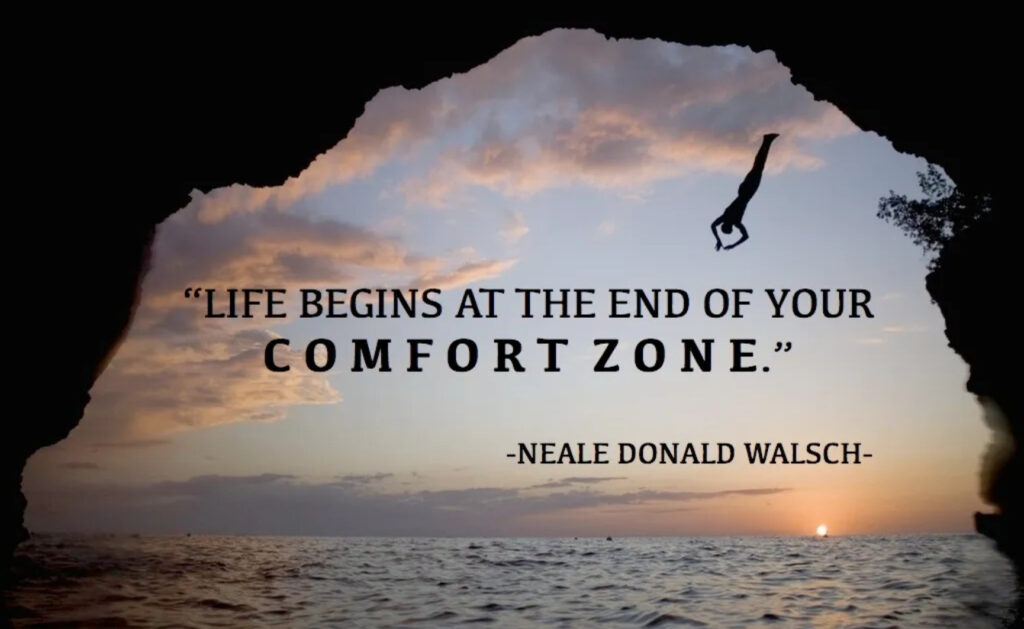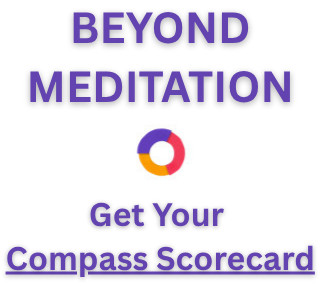
The High Cost of Staying in Your Comfort Zone.
Are you choosing syntropy or entropy? In other words growth or deterioration …
Because if you don’t make a choice, you’ll miss all of your dreams.
We often hear about the importance of pushing beyond our comfort zones, yet most people cling to theirs with quiet loyalty. It’s familiar. It’s safe. It’s predictable. But what’s the real cost of staying in your comfort zone? While the world continues to change, evolve, and expand, staying still often means falling behind.
Your comfort zone may feel like protection—but in reality, it’s often a prison. A quiet, padded, well-decorated cell that gently numbs your ambition, waters down your potential, and delays your growth.
This article explores the real cost of staying in your comfort zone—emotionally, financially, psychologically, and even spiritually—and why expansion is not just desirable, but necessary.
What Is the Comfort Zone?
The comfort zone is a psychological state where things feel familiar, easy, and low-risk. It’s where routines reign, surprises are rare, and discomfort is avoided.
There’s nothing inherently wrong with being in your comfort zone. In fact, it’s often a place of recovery or stability. But the danger lies in living there indefinitely. When comfort becomes a lifestyle rather than a resting point, it comes at a significant cost.
1. The Cost of Missed Opportunities
One of the most invisible—but devastating—costs of the comfort zone is the sheer number of missed opportunities.
When you’re in your comfort zone, you say no to things that feel uncertain—even when they could change your life. You might pass on:
A job opportunity because you feel under-qualified.
A chance to speak or lead because you’re afraid of judgment.
Starting a business or creative project because you’re scared of failure.
A relationship that asks more of you emotionally.
But here’s the truth: the life you desire lives in the opportunities you avoid.
Many people tell themselves “the timing isn’t right,” when in reality, it’s their comfort zone whispering, “Stay small. Stay safe.” But safety rarely equals satisfaction.
Over time, these missed opportunities stack up. They become regrets.
2. The Erosion of Confidence and Courage
Confidence isn’t something you’re born with; it’s built through action. When you avoid discomfort, you rob yourself of the small wins and growth experiences that build belief in yourself.
Courage, like a muscle, weakens when not used. The longer you avoid risk, the scarier even small challenges become. Your world begins to shrink. Tasks that once seemed manageable start to feel overwhelming. You hesitate more. You trust yourself less.
Eventually, fear becomes the dominant voice in your life, guiding your decisions and stealing your potential.
3. Stagnation of Skills and Growth
The comfort zone doesn’t just block emotional growth—it blocks intellectual and skill development too.
When you stop taking on new challenges, your brain stops creating new neural pathways. You become less adaptive, less creative, and less resilient. This is especially dangerous in a fast-paced world that rewards innovation, adaptability, and lifelong learning.
Think about it: When was the last time you learned a skill that scared you a little? Took on a project that stretched you? Asked for feedback you weren’t sure you could handle?
If you can’t remember, it’s likely you’ve plateaued.
And plateaus don’t just feel flat—they eventually feel suffocating.
4. The Hidden Financial Cost
There’s also a financial cost to living in the comfort zone.
When you avoid putting yourself out there, negotiating, asking for more, or pursuing a more fulfilling path—you often settle for less than you’re worth.
How many people stay in unfulfilling, underpaid roles because the fear of change outweighs the desire for more?
The comfort zone convinces you to “be grateful” and not rock the boat. But gratitude should never be used as an excuse for stagnation.
Over a lifetime, the cost of not advocating for yourself can easily reach six figures—or more.
5. The Emotional Toll: Boredom, Restlessness, and Low-Level Anxiety
Ironically, the comfort zone often doesn’t feel all that comfortable over time.
Many people describe a growing sense of unease—boredom, dissatisfaction, irritability, or numbness—when they’ve stayed stuck too long.
This emotional dullness is often misdiagnosed. We think something external needs to change: a new car, a holiday, a partner. But often, what needs to change is within: the willingness to stretch, evolve, and reclaim a sense of aliveness.
Discomfort in growth is temporary. But discomfort in stagnation is chronic.
6. Disconnection From Your Purpose
Staying in the comfort zone is the fastest way to drift from your purpose.
Purpose lives in uncertainty. It asks you to listen deeply, take risks, follow hunches, and sometimes stand alone. It challenges your ego and expands your heart. It requires you to step outside what’s familiar—and into what’s meaningful.
When you stay in your comfort zone, you may find temporary peace—but it will likely come at the cost of long-term fulfillment.
The voice of your soul doesn’t shout. It whispers. And you hear it best when you’re willing to get quiet and move past comfort into courage.
7. Lost Time—The One Resource You Can’t Get Back
Every day you spend avoiding discomfort is a day lost to mediocrity.
Time is the only non-renewable resource. You can make more money. You can heal from failure. You can try again. But you can never get time back.
And the longer you wait, the harder it gets.
What feels safe today might feel like regret tomorrow.
The Reward of Discomfort: A Life Fully Lived
So, what happens when you do leave your comfort zone?
You meet parts of yourself you didn’t know existed.
You develop grit, resilience, confidence, and power.
You attract new opportunities, people, and abundance.
You find alignment with your purpose.
You become truly alive.
Does it feel scary? Of course.
But it’s worth asking: Which fear is greater? The fear of stepping out—or the fear of never becoming who you’re meant to be?
How to Begin Expanding Your Comfort Zone
Here are a few practical steps to begin stretching your edge without overwhelming yourself:
-
- Start small: Do one thing each day that makes you slightly uncomfortable.
- Practice reframing fear: Instead of asking “What if I fail?” ask “What might I miss if I don’t try?”
- Visualize your future self: Who do you become if you keep playing small? Who could you be if you expanded?
- Surround yourself with stretchers: People who challenge you, inspire you, and won’t let you settle.
- Celebrate bravery, not outcomes: The goal isn’t perfection—it’s growth.
- Final Thoughts: You Were Not Meant for Smallness
You weren’t born to play it safe. You weren’t born to hide your brilliance behind fear. There is a part of you that is wildly capable, infinitely creative, and deeply powerful—but you’ll never meet that version of yourself inside your comfort zone.
So today, ask yourself:
Where am I choosing comfort over courage?
What would my life look like if I decided to stretch, rather than settle?
The cost of staying in your comfort zone may not be visible immediately—but it always adds up. The real question is: Are you willing to pay the price of staying the same?
Your growth, your freedom, your fullest expression… all lie on the other side of discomfort.
Don’t wait. Because entropy is the cost of staying in your comfort zone.
BEYOND MEDITATION




